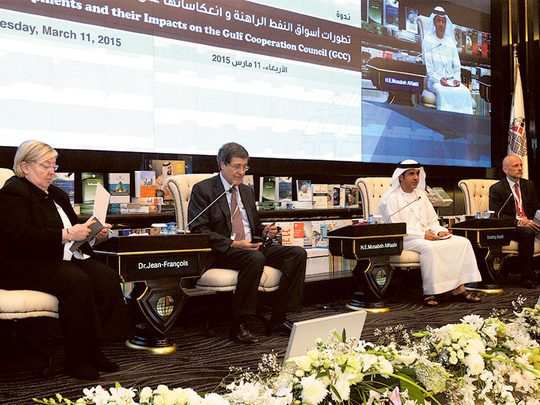
Abu Dhabi: The UAE economy is stronger than ever and will not be impacted due to drop in oil prices, a top official from the ministry of energy said.
“We are not worried at all due to decrease in oil prices. Our economy is strong,” said Ahmad Al Ka’abi, director of the petroleum economics department in the Ministry of Energy.
He said drops in oil prices are not new and have happened before.
“Our economy was not affected when oil prices went down earlier. It will not affect now. Our economy is much stronger than before,” he said while speaking at a symposium on current oil market developments in Abu Dhabi on Wednesday.
Oil prices have dropped by about 60 per cent since June last year due to rising production and less demand from Europe and China. Brent, the international crude benchmark, was trading at less than $60 per barrel on Wednesday.
Al Ka’abi said the UAE’s dependence on oil has fallen sharply over the years.
“The country is adopting a new strategy in the energy sector, which includes amalgamation of nuclear energy and creation of renewable sources to meet the energy demand. By 2020, we will have four nuclear stations and they will provide 25 per cent of the UAE’s energy needs. We are investing in diversification of our energy sources.”
He added that the growth of the US shale production was the most important factor that contributed to the decline in oil prices.
On the other hand, a senior official from Kuwait Petroleum Corporation said that none of their projects were stalled due to drop in oil prices. “All the major projects are going ahead. We have a strategy to reach 4 million barrels per day of oil production by 2020. We are trying to reach the target and take actions,” said Dr Mohammad Khuder Al Shatti, an oil analyst and manager of the CEO’s office at the Kuwait Petroleum Coporation.
He said the fall in oil prices has brought in new changes in the oil industry in the Gulf countries.
“It is not about cutting projects but thinking about diversification, which is very important. In the UAE, Saudi Arabia and Kuwait, there is a drive towards diversification and put emphasis on solar power and other sources of renewable energy. In Kuwait, 15 per cent of our energy will be renewable energy by 2030.”
“It is good for the countries. We are in a better position because of high financial reserves, which we accumulated over the years. The present situation is pushing for much more mature thinking in terms of expanding on renewables and studying and reviewing subsidies. There will be rationalisation of expenditure.”
Kuwait exports the fifth-largest volume of crude oil and condensates following Saudi Arabia, the UAE, Iraq, and Nigeria among Opec countries.












